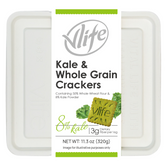The Power of Kale: A Superfood You Shouldn’t Miss
In the world of superfoods, kale has rightfully earned its place at the top of the list. This leafy green vegetable is not only packed with essential nutrients but also provides a range of health benefits that make it a must-have in your diet. Whether you’re a fitness enthusiast, someone striving for better overall health, or simply looking to eat more nutrient-dense foods, kale is a game-changer.
Why Kale Deserves a Spot in Your Diet
Kale is often referred to as a “superfood” due to its high concentration of vitamins, minerals, and antioxidants. Let’s break down the nutritional power behind this leafy green:
1. Packed with Nutrients
Kale is an excellent source of:
-
Vitamins A, C, and K: These essential vitamins play a crucial role in immune function, skin health, and bone health. In fact, a single cup of raw kale contains 206% of your daily recommended intake of Vitamin A and 134% of Vitamin C.
-
Folate: Kale is rich in folate, a B-vitamin that’s vital for cell growth and the formation of red blood cells. This makes it an excellent choice for pregnant women, as folate is essential for fetal development.
-
Calcium: Unlike many leafy greens, kale is a fantastic non-dairy source of calcium. It helps support strong bones and teeth, which is especially important for those who avoid dairy products.
2. Rich in Antioxidants
Kale is loaded with antioxidants, including beta-carotene and flavonoids, which help combat oxidative stress and reduce inflammation in the body. These antioxidants can play a role in reducing the risk of chronic diseases such as heart disease, diabetes, and cancer.
3. High in Fiber
Kale is an excellent source of dietary fiber, which is essential for maintaining a healthy digestive system. Just one cup of kale provides around 1 gram of fiber. Fiber is crucial for regulating blood sugar levels, promoting gut health, and supporting healthy cholesterol levels.
4. Supports Heart Health
Kale contains potassium, a mineral known for its ability to regulate blood pressure. It also has omega-3 fatty acids (alpha-linolenic acid or ALA), which can help reduce inflammation and lower cholesterol. Research has shown that a diet rich in omega-3s can reduce the risk of heart disease and promote overall cardiovascular health.
5. Boosts Detoxification
Kale contains glucosinolates, sulfur-containing compounds that help activate enzymes involved in detoxifying the body. These compounds support the liver’s natural detoxification processes and may help protect against certain cancers.
How Kale Helps with Weight Management
If you’re looking to maintain or lose weight, kale is a great addition to your diet. Due to its high fiber content, kale helps increase feelings of fullness and reduces appetite, making it easier to stick to your calorie goals. Plus, kale is very low in calories, with just 33 calories per cup of raw kale. This makes it an ideal food for those who are watching their calorie intake but still want to feel satisfied after eating.
Kale and Its Role in Plant-Based Diets
Kale is a crucial part of any plant-based diet because it provides essential nutrients that might be harder to obtain from plant foods alone. For example:
-
Protein: While kale isn't a high-protein food compared to beans or legumes, it still provides a decent amount of protein for a leafy green—about 2 grams per cup.
-
Iron: Kale contains iron, which is important for transporting oxygen in the blood and maintaining energy levels. A cup of cooked kale provides around 6% of the recommended daily intake for iron, making it an important food for vegetarians and vegans.
How to Add Kale to Your Diet
-
Smoothies: Adding a handful of kale to your smoothie can boost its nutrient content without altering the flavor too much. Combine it with fruits like bananas, berries, and avocado for a nutrient-dense smoothie.
-
Salads: Kale’s sturdy texture makes it a great base for salads. Massage the leaves with olive oil and a little lemon juice to soften them before adding other ingredients like avocado, nuts, seeds, or fruits.
-
Sautéed or Stir-Fried: Kale can be sautéed with garlic and olive oil, or added to stir-fries and soups for extra nutrition and flavor.
-
Kale & Whole Grain Crackers: A healthier alternative to traditional crackers. Boost your kale dishes with our whole grain crackers, packed with protein and fiber to keep you feeling full and satisfied. Whether you’re fueling up after a workout or looking for a healthy meal replacement, these crackers offer the perfect balance of nutrition and crunch.
Kale’s Nutritional Profile: A Quick Look
Here’s a quick overview of kale's key nutrients per 1 cup (67g) of raw kale:
| Nutrient | Amount | % Daily Value (DV) |
| Calories | 33 kcal | – |
| Vitamin A | 10,302 IU | 206% |
| Vitamin C | 80.4 mg | 134% |
| Vitamin K | 547 mcg | 684% |
| Calcium | 90 mg | 9% |
| Iron | 1.1 mg | 6% |
| Fiber | 1.3 g | 5% |
| Protein | 2.2 g | 4% |
| Omega-3 fatty acids (ALA) | 0.1 g | – |
Conclusion: Kale is a Superfood You Can’t Ignore
Incorporating kale into your diet is an easy and delicious way to boost your health. Whether you're looking to improve your fitness, support your heart health, or just enjoy nutrient-dense food, kale checks all the boxes. Its wide range of vitamins, minerals, and antioxidants makes it one of the best plant-based foods available, offering numerous benefits for your body and mind.










